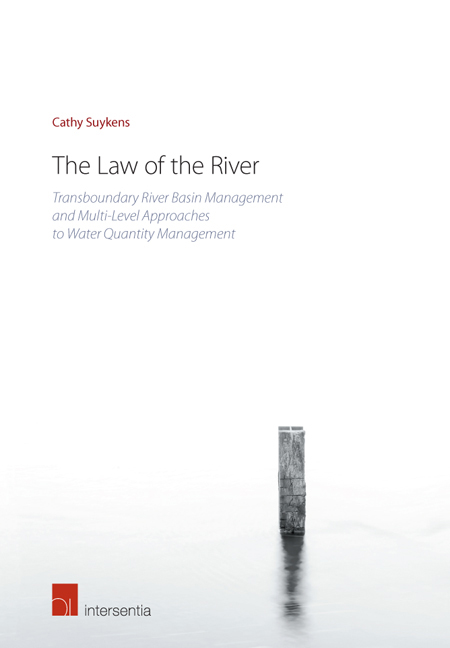 The Law of the River
The Law of the River Book contents
- Frontmatter
- Acknowledgments
- Contents
- Figures and Tables
- Acronyms
- Chapter I Introduction
- Chapter II The EU Legal Framework for Transboundary Waters with a Focus on Water Quantity Management
- Chapter III ‘Come Hell and High Water’ –The Law of the Scheldt District
- Chapter IV Case Study: Transboundary Water Governance in the United States with a Focus on the Delaware Basin
- Chapter V Recommendations
- Chapter VI Conclusions
- Bibliography
Chapter II - The EU Legal Framework for Transboundary Waters with a Focus on Water Quantity Management
Published online by Cambridge University Press: 12 October 2018
- Frontmatter
- Acknowledgments
- Contents
- Figures and Tables
- Acronyms
- Chapter I Introduction
- Chapter II The EU Legal Framework for Transboundary Waters with a Focus on Water Quantity Management
- Chapter III ‘Come Hell and High Water’ –The Law of the Scheldt District
- Chapter IV Case Study: Transboundary Water Governance in the United States with a Focus on the Delaware Basin
- Chapter V Recommendations
- Chapter VI Conclusions
- Bibliography
Summary
INTRODUCTION AND DELINEATION OF SCOPE
This chapter analyses the European legal framework for cooperation regarding transboundary waters primarily from the viewpoint of water quantity management. As explained in Chapter I, for the purposes of readability, water quantity management is used as an umbrella term encompassing scarcity, droughts and floods. The reasons from choosing water quantity as the main lens through which transboundary water management is viewed, have been explained in Chapter I as well.
It is noteworthy that although water quantity is teased out in this Chapter, it should not only be seen as a self-standing category but also in its relation to water quality. In other words, this Chapter will set forth the role of water quantity management in the EU legal framework, as well as its link with water quality management. For example, in the discussion of the evolution of the legal basis for “quantitative management of water resources” pursuant to the EU Treaty, the comparison with the legal basis for water quality management will be highly relevant. In contrast, this Chapter will not delve into the EU-law requirements for water quality management, i.e. the requirements aimed at combating pollution of water bodies in the EU.
Analysing water quantity management in transboundary waters in the EU requires both an analysis of the EU primary and secondary law framework for the quantitative aspects of water resources, but also the mechanisms this framework provide to induce cooperation in these transboundary waters. Such a comprehensive, twofold, approach is necessary to identify the bottlenecks and in turn formulate recommendations at the end of this book.
The analysis will be guided by the five pillars of transboundary water governance as identified by the Global Water Partnership: (i) scope, (ii) substantive provisions, (iii) procedural provisions, (iv) institutional mechanisms and (v) dispute settlement. These five pillars allow a comprehensive overview of all relevant aspects that form part of the framework. By using the pillars and the encompassing approach these enable to adopt, bottlenecks entrenched in said EU legal framework will be systematically identified. The chapter will both focus on the applicable EU regime for water quantity management, pursuant to primary and secondary law, and the manner in which this regime facilitates cooperation between EU Member States in shared waters.
- Type
- Chapter
- Information
- The Law of the RiverTransboundary River Basin Management and Multi-Level Approaches to Water Quantity Management, pp. 47 - 120Publisher: IntersentiaPrint publication year: 2018


